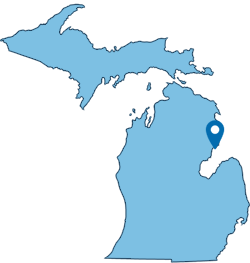Travel Planner

“The Natural World”
Episode #1909 Travel Planner
Mother Nature takes us on a trip to watch her beauty come alive. An Eagle feeding her young, the bird migration through this area and then an enjoyable trip through a wildlife filled wetland.
Kirtland's Warbler

Location: Jack Pines of the Huron National Forest
The Kirtland's warbler is a songbird that nests in young jack pine stands. Until 1995 Kirtland's warblers had only been known to nest in the northern part of Michigan's Lower Peninsula. Today, they also nest in the Upper Peninsula, Wisconsin and Canada. They migrate from their nesting grounds to the southeastern coast of the United States on their way to wintering grounds concentrated in the Bahamas. The male Kirtland's warblers' summer plumage is composed of a distinctive bright yellow colored breast streaked in black and bluish gray back feathers, a dark mask over its face with white eye rings, and bobbing tail. The female's plumage coloration is less bright; her facial area is devoid of a mask. Overall length of the bird is less than six inches.
- Kirtland's Warbler and Jack Pine Wildlife Tours [Huron National Forest]
- Kirtlands's Warbler Tours [Michigan Audubon]
Clark's Marsh

Location: Forest Trail south of the airport, Oscoda, MI
Clark’s Marsh is a collection of still woodland ponds and old growth forest. Its flat grassy trails make it a perfect place for visitors to view rare native wild flowers and many species of wild birds including the most productive Eagle's nest in the area.
Trumpeter Swans

Location: AuSable River
Today, three species of swans can be found in Michigan. The trumpeter is the largest and has an all-black bill. Weighing from 25-35 pounds when fully grown, the trumpeter swan is the world's largest waterfowl. When fully extended, their wingspan can reach nearly eight feet.
- Birding [Visit Tawas Bay]
Wildflowers

Spring is so filled with beauty that we just had to spend sometime learning about the wildflowers that are found in this area. We are very fortunate to have been introduced to many experts in our journeys and that was also true here as we met with wildflower expert and High School biology teacher George Faulkenhagen.
- Horticulture & Mushrooms [Visit Tawas Bay]
Tuttle Marsh Wildlife Area

Location: Tuttle Marsh Wildlife Area is located approximately 7 miles north of Tawas, and 6 miles southwest of Oscoda. From Tawas, travel west on M-55 one mile to Wilber Road. Turn right and proceed 4 miles to the stop sign at Galion Road. Turn right and drive 1/2 mile to Sherman Road. Turn left and continue 1.5 miles to May Road. Turn right and drive 1/2 mile to Brooks Road. Turn right and follow the winding gravel road for 3/4 mile to Tuttle Marsh Road on the left. Tuttle Marsh Road is about 4 miles long. From Oscoda, travel Old US-23 west 5 3/4 miles to Tuttle Marsh Road. Turn left into the Tuttle Marsh Wildlife Area.
A 400-acre impoundment is at the heart of this site, which is surrounded by hundreds more acres of seasonally flooded wetlands. Tuttle Marsh has no facilities or developments, but visitors are encouraged to use the wetland dike as a hiking trail.
- Tuttle Marsh Area 1.29mb
- Tuttle Marsh [Visit Tawas Bay]


